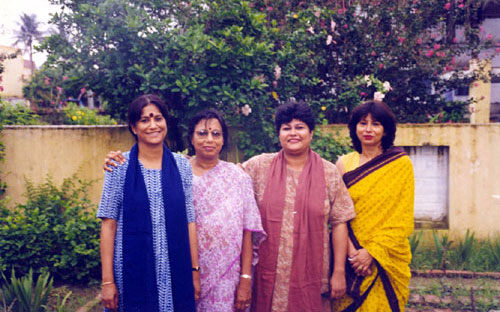SANTWANA BHATTACHARYA,
14 DECEMBER 2006, INDIAN EXPRESS, NEW DELHI.
History is a word that hangs over the residence of Patna University Professor, Papiya Ghosh like an old curse.
She used to teach the subject and a book on Partition, authored by her, was slated for a January release. In all, a serene academic life that seemed to hold nothing that could have provoked her brutal murder last fortnight.
Eight stab wounds, eyes gouged-out, a burgled house.
On the surface, the sort of violent crime that chooses its victims at random, save for the usual criterion: she was a 53-year-old woman, well off and living alone.
But scattered in the debris of Papiya’s life are strange clues that point back in time. To a personal history almost as old as the subject of her book.
She was killed on the same day her father, Bihar bureaucrat Ujjal Kumar Ghosh, was killed nearly 50 years ago.
Was it just an uncanny coincidence, or is there a connection to that older, as-yet “unsolved murder”. An old enmity that still lingers? How come no one , not even those manning the police station 500 yards away from her house, heard a sound that night? And why did her dogs — the two fiercely protective Pomeranians — not bark? There was no sign of a forced entry, so was it someone she knew?
The other facts too don’t add up. If it was a simple burglary gone wrong, why the brutality-the multiple stabs, the gouging out of the eyes, other stray signs of sadism? If it was a land shark getting rid of a feisty, middle-aged academician to grab her prime property, why was the house cleaned out-down to the gas cylinder? How was all the loot carried-it could not have fitted into the small Maruti 800 which, too, was taken away from the garage?
Even the hard disk containing the last two volumes of her yet-to-be published work are missing. The questions are swirling around in the isolated bungalow No. 168 in Patna’s posh Pataliputra Colony where she lived with her elderly maid Malti Devi, who too was killed. (The maid’s two grandsons, who lived in the same house, were away that night.) Now, a week or so after that gruesome wintry night, it is being talked about as a “dead-end” case.
On January 1, 2007, when Routledge releases Papiya’s book Partition and The South Asian Diaspora _ Extending the Subcontinent’ at IIC, sister Tuktuk Ghosh wants to keep the occasion quiet. For Tuktuk, a senior West Bengal cadre IAS officer, it is a double burden: the burden of being part of the ‘system’ and being patient enough to leave it to its meandering ways.
Tuktuk, visibly shattered, recounts the facts. Matched with other versions, including that of Patna police, here’s the gist: it was on early December 3, when the morning house help came around, that Papiya and her 70-year old maid’s bodies were discovered. It was not a sight anyone would ever want to confront. From head to toe, every part of Papiya’s body had been pierced-with a kitchen knife picked from the house itself Malti Devi was not spared either-four stab wounds, the same heart-stopping brutality. The stamp of extreme hatred and vengeance was all over the dead bodies, says Bihar’s home secretary Afzal Amanullah, who is Papiya’s neighbour.
Tuktuk, who rushed from Delhi, confirmed that Papya’s belongings were missing. Washing machine, gas cylinder, Maruti 800, music system, computer, watches, camera, whatever gold and money there was in the house. Only those cupboards and heavy wood almirahs which had valuables were opened and ransacked. Others were untouched.
Though wary of rubbing the investigative agency the wrong way, Tuktuk offers tentatively, “Burglary could just have been a front¿ She always made it clear that she would never move out of that property. It was to look after my mother and the house she had built that Papiya left a job in Delhi University and shifted to Patna. She could have had a job anywhere in the world, she had earned that kind of respect from her fraternity.”
Tuktuk refuses to accept that it was a “motiveless murder”. “A super-intelligent mastermind seems to be at work, unleashing the worst form of savagery. The wounds were vicious” she almost shivers as she talks.
What could be the reason behind “the barbarity, the butchering”, adjectives spill out of Tuktuk. As she lets them go, she almost clutches back at them, quietly angry but unsure of opening out fully. “Her last moments must have been very painful”. Even the nails were plucked out. “What could be the motive, it cannot be a senseless crime” her voice trails off.
Steadying herself, Tuktuk-commonly thought of as Papiya’s twin since the time they wrote articles in Junior Statesman-shares the personal history she’s never uttered in the last 50 years: “To me, it seems quite utterly uncanny, it was the same date-the night of December 2/3. My father was administered poison by a hospital nurse at the Patna Government hospital at someone’s bidding. Then too, the mastermind was never caught.”
It was their mother who brought up them up (in all, four sisters) and built the house with its sprawling garden. An exclusive enclave meant for senior officials, the Government had given them the land after the father’s mysterious death. In fact, say officials familiar with the old case, the Patna District Magistrate was appointed their local guardian.
With Tuktuk approaching the Prime Minister and President and Papiya’s well-known academic friends from across the globe writing to the PM and CM Nitish Kumar, the Patna police is understandably under pressure. Amanullah says, “We hope to crack the case in two three days. It is a difficult witness-less case, no one is coming forward to help or cooperate. But there are certain strong leads. If the trail goes cold, we’ll call in the CBI.”
